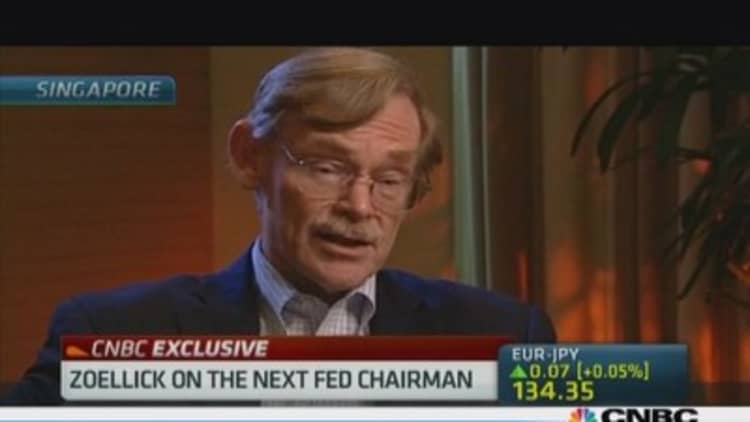
President Barack Obama's handling of the Federal Reserve chairman nomination process shows signs of weakness in his ability as a leader, former World Bank President Robert Zoellick told CNBC.
"The challenge for the President is that, after having his first preference denied by his own party, to then pick somebody who seems to be pressed forward by members of his party, raises some questions about his own authority as President," Zoellick, who now serves on the board of Singapore based investment firm Temasek Holdings, said in an exclusive interview with CNBC on Sunday.
(Read more: Get ready for a Summers rally after exit from Fed race)
Last week Obama's favored candidate for the role of Fed chairperson, Lawrence Summers, withdrew his name from consideration, leaving vice-chair Janet Yellen as the leading contender for the role, and sparked speculation over how much power the President has over his own party.
"[Obama] is just in the first year of his second term. The failure to understand that his own democratic caucus was not going to support him on the vote on Syria, plus the Larry Summers issue, raises questions about what influence he will have in his own party," Zoellick said, referring to the lack of support Obama received over a potential military strike on Syria.
(Watch This: Will Syria's weaponsagreement last?)
"This will affect immigration [and] trade policy, [and will] obviously be an issue in the budgets and in debates going forward," he added.
The debate over who will replace Bernanke when his term expires in January has gripped markets over recent months. Summers, a former treasury Secretary under the Clinton administration, faced fierce criticism over his fiery temperament and hawkish economic views, with some going as far as to describe his possible appointment as a "black swan event" for financial markets.
Zoellick added that Obama's weakened position could make upcoming obstacles for the U.S. government more challenging, including the decision over raising the debt ceiling and the contentious budget debates.
(Read more: Obama uncertain on Syria strike without Congress)
"I think it's a challenge in that, not only do you have the President in an unfortunate position, but the Republican leadership in the house has a challenge with some of its own memberships," he said.
However, not everyone agreed that Summers' withdrawal reflected poorly on President Obama.
"Given the potential to cause problems within the Democratic party let alone the broader Congress, his [Summers'] stepping down actually speaks very well for the President's authority," said Michael McCarthy, chief market strategist at CMC Markets.
Market attention has recently turned to the U.S. government's expanding debt ceiling, as the $16.7 trillion debt limit looms closer in October.
(Read more: Obama to Boehner: I won't negotiate on debt limit)
The ruling Democrats need Republican support to raise the debt ceiling, but the Republicans have said they will only agree if the Democrats agree to strip funding from the Affordable Care Act.
Some analysts have warned of an aggressive market selloff, or even a potential government shutdown if an agreement is not reached on these issues.
"Normally in the U.S. system these things work out at the end of the day. If I was forced to bet, I'd say that's still the case, but you got greater risk going into this period than you would normally have in the past," added Zoellick.
—By CNBC's Katie Holliday: Follow her on Twitter @hollidaykatie


